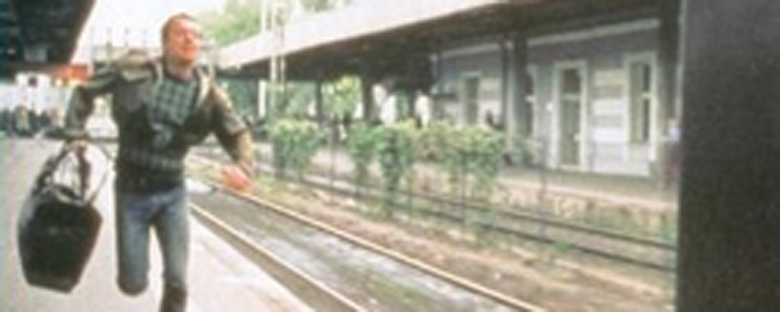Reviews
Przypadek
Krzysztof Kieslowski
Poland, 1981
Credits
Review by Rumsey Taylor
Posted on 08 September 2004
Source Kino Video DVD
Related articles
features: Kieslowski’s Trois Couleurs
reviews: Camera Buff
reviews: No End
reviews: The Scar
Among the most evident thematic exercises in Krzysztof Kieslowski’s work is the influence coincidence wields on a life’s trajectory. This trait is most knowingly exhibited in his componential works — The Decalogue and the Three Colors trilogy, in which parallel narratives are depicted successively in each series of films — and most summated in Blind Chance.
The film debuted at the 1987 Cannes Film Festival, six years after it was completed. Many of Kieslowski’s films in his early career are informed by Poland’s indigenous social climate, and there are instances, such as this, in which his work was domestically censured; one of Blind Chance’s stemming episodes involves a man’s, Witek, growing affiliation with a labor movement (deemed Solidarity, which opposed the country’s communist regime) as well as the party’s impetuous growth, garnering at its height over a fourth of Poland’s eligible population. As the film, at least in part, tolerates reactionary democracy in a politically stagnant country, it is a propagandistic voice of dissent. Blind Chance’s political appliance is, however, minor, and second service to the film’s distinguishing parallel narratives.
The film begins describing Witek’s position as a medical student, taking a leave of absence to visit his dying father. He arrives late at a train station, and pummels through a crowd towards a departing train. The composition encloses his desperate hand as it’s inches away from the train’s tailgate, and, from this instant, the film displays three conclusions in succession.
At this point Witek’s three “existences” — which are various — are put in motion by the subtle and often unnoticed actions at this station that will either prohibit or permit his admission on a Warsaw-bound train. The second time this scene occurs the outcome is different from the first, and we scrutinize the responsible circumstances to attribute significance to the man swigging a beer, for example, whom Witek bumps into in each instance, each time with variable force. Despite the different routes his life will assume hereafter and in effect, Witek’s fate is governed by this episode. There’s the implicit suggestion that a life is dynamically influenced by the most mundane interruption — the speed with which Witek, arms full of luggage, turns a corner may subsequently result in his religious affiliation, for one — but such interruptions are arbitrary in this film. It’s a contrivance to ensure the variety of Witek’s three lives; otherwise the film is redundant.
A component of Kieslowski’s execution of coincidence — which is an oxymoronic notion in any fiction — is closure, that security is cumulatively afforded by people whose unpredictable, often desolate lives are the subjects of his films. Each of the three episodes culminates with Witek at an airport. Initially, he misses his flight. As the conclusion of the third outcome will tell, Witek’s life is primarily determined by transportation; the necessity (or inability) to travel will decide his political affiliation, as well as his marital relationships. As with the Three Colors trilogy (in which every previously forsaken, unlucky, and depressed character is given a redemptive, optimistic ending), Blind Chance’s three episodes are circular. In the final scene, Witek succeeds in catching his flight, and as with Kieslowski’s brilliant trilogy, the success is accompanied by catastrophe.
We don’t do comments anymore, but you may contact us here or find us on Twitter or Facebook.



